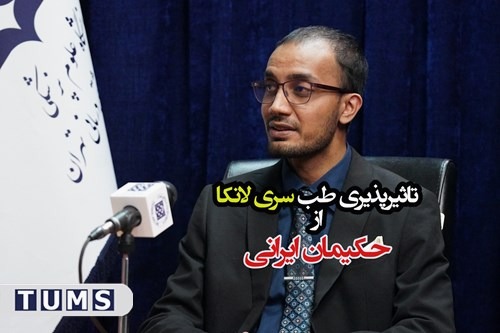Dr. Mohammad Zamir Karim: Sri Lankan medicine and literature is influenced by Iranian medicine and Persian language

Dr. Mohammad Zamir Karim, a researcher of the history of Sri Lankan medical sciences, visited the centres and related scientific resources in Tehran University of Medical Sciences in order to conduct research on the influence of Iranian medicine on Sri Lankan medicine.
According to the public relations report of Tehran University of Medical Sciences , Dr. Mohammad Zamir Karim, a medical graduate from the University of Colombo and a master's student in the history of medicine and philosophy of medicine in Sri Lanka, a visiting professor at the University of Colombo and the universities of Indonesia and Turkey, and one of the activists of Sri Lanka's national television and private channels in the field of medicine and history of medicine and he came to Iran a week ago at the invitation of the Organization of Islamic Culture and Communication for the purpose of researching the impact of Iranian medicine on Sri Lankan medicine, and during his stay he met and discussed with the officials and faculty of Tehran University of Medical Sciences.
Dr. Zamir Karim said that as a 29-year-old researcher, I am happy and satisfied with my trip to Iran: During this time, I visited the centres affiliated to Tehran University of Medical Sciences, the University Library and the Faculty of Iranian Medicine, and the Medical Ethics centre, and I plan to visit the History Museum of medical sciences. During this time, I used books, articles and theses, especially manuscripts available in libraries.
Referring to the influence of Iranian doctors on Sri Lanka, he said: From the 8th to the 15th century and before the colonization of Sri Lanka by the Europeans, Iranian doctors were the main doctors in Sri Lanka, and the common physicians of Sri Lanka were Iranian physicians, and I am concerned with the works of Iranian doctors and philosophers. I am researching Abu Ali Sina, Abu Rihan al-Biruni, Muhammad bin Zakariya Razi, Majosi and other doctors and philosophers who travelled to our country. During this period, Iranian doctors introduced many herbal medicines to Sri Lanka and we also exported cinnamon, cloves and sandalwood to Iran.
As the first medical history researcher of his country, Dr. Zamir Karim, referring to the influence of Iran's relations on Sri Lanka, said: We had strong commercial relations with Iran during the Achaemenid, Parthian, and Sassanid eras, and these relations continue in some way until now. Before the Europeans came to Sri Lanka, all Sri Lankan kings and courtiers spoke fluent Persian. Even Ibn Battuta, who visited Sri Lanka in the 13th century, recorded in his works that the kings and courtiers of Sri Lanka spoke Persian, and from there we saw the influence of Iranian civilization on our country. But unfortunately, the Europeans destroyed Sri Lanka's manuscripts and books, and we don't have any traces of this era.
This Sri Lankan researcher considered the visit to Tehran and Tehran University of Medical Sciences as a reminder of Iran's influence on Sri Lanka and said: In the poems of Ferdowsi, Hafez and Jalaluddin Rumi, Ceylon or Saran-dip are mentioned as prehistoric names of Sri Lanka. Iran has influenced the language and literature of Sri Lanka and many of the words we use are derived from the Persian language. .
Dr. Zamir Karim stated that Sri Lanka was the first place where Adam descended from heaven based on Islamic Narratives and said: On Tuesday, September 21th, I will unveil the results of my research at the University of Tehran, and on Wednesday, September 22th, at the Sri Lankan Embassy, I will present the impact of Iranian medicine on Sri Lankan medicine. The result of this research has a significant impact on the mutual recognition of the two countries.
Seyed Mahdi Fazeli
International Relations Expert


comment